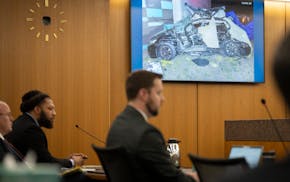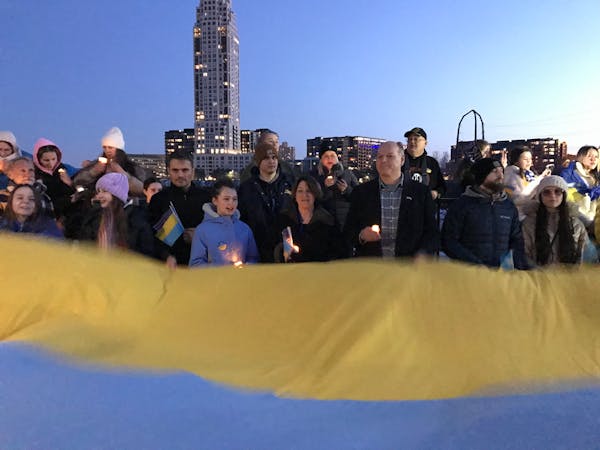Strangers helped Svetlana Vold start a life she couldn't have imagined.
It was 2011 when Vold stuffed her belongings into two suitcases and moved to St. Paul. It was a chance for her family to start over after decades growing up in Belarus, where jobs for women are scarce. Vold "didn't have anything" arriving to the United States.
Strangers heard of her struggle and pitched in, donating furniture, clothes and items her family needed to get by. So when war engulfed Ukraine more than two years ago, Vold, now a St. Paul firefighter, wanted to give back the way people had helped her.
She's mobilized people across Minnesota to collect and deliver essential supplies to first responders in Ukraine. Since then, fire departments in St. Paul, Minneapolis, Eagan and Coon Rapids have gathered scores of equipment that could make a world of difference to first responders risking their lives overseas.
People who rescue people
When Vold was growing up, she set aside her dreams to become a firefighter.
Born in Belarus during Russian occupation, Vold's father was a fire captain who led many first responders into danger. But jobs for women were scarce at the time, and remain so today. Vold said there are about 200 jobs that Belarus bars women from taking, including many first-responder positions. When her husband and daughter won a green card to the United States in 2011, she witnessed the breadth of opportunities.
"When I moved here I remember walking like, 'Women cut the trees, women drive the trucks, women do [all these]' and I'm like, 'Oh my gosh, this is my world!'" she said.
When Russia mounted a full-scale invasion of Ukraine in 2022, Vold scoured for ways to help people. She volunteered with local organizations, cooking for Ukrainian soldiers who'd lost arms, legs, and other body parts requiring prosthetics.
As she learned those soldiers' names and stories, Vold felt inspired to do her part as an aspiring emergency responder. She gathered medical supplies to deliver to Ukraine, bringing what she could to first responders as travel restrictions limited what people could transport. When the St. Paul Fire Department called to tell Vold it had accepted her application and wanted to schedule an interview, she told them it would have to wait for three weeks.
"I said to [Human Resources], 'I'm actually in Ukraine right now,'" Vold said, recalling that conversation, "and it was amazing because she said to me, 'Great! What are you doing? We can work with this.'"
St. Paul Fire Department Capt. Keith Golden said Vold's trips were an opportunity to help everyone. Golden is assigned to Fire Station 7 on the city's East Side and helps to manage the department's equipment. Firefighters discard items that reach the limits of their shelf life according to U.S. standards, but Golden said those standards differ in Ukraine where emergency workers fight fires with little to no equipment.
"Compassion fatigue starts to limit people's response," Golden said of aid to Ukraine, adding that some ambulances have been targeted there in the war and many vehicles and stations were bombed. "[When] you start feeling like the world's abandoning you, it's nice to get a little influx of support."
The equipment fire departments have collected includes more than 60 sets of firefighter turnout clothing, including jackets, boots, and other protective clothing, thermal imagers, medical supplies and nearly two dozen respirators. Vold said many firefighters in Ukraine work without such gear, even as some are killed responding to flames sparked by war.
"I still have in my memory the picture of a firefighter who's hold[ing] his dad, who's a firefighter too, and was killed," Vold said, adding that some first responders now wear bulletproof vests over their equipment. "We're not talking about political views. It's more about helping people, because firefighters [are] not soldiers. Look at it this way: Firefighters are people who rescue people."
The need is there
Mykola Sarazhynskyy with Stand with Ukraine MN can attest to Ukraine's struggles.
Sarazhynskyy helps organize shipments between Minnesota and Ukraine. The gear will take a monthslong trek, first to Poland where it will be loaded into trucks, driven across the border and brought to a postal service hub to be shipped to responders in need.
"It's very important because they risk their lives," Sarazhynskyy said.
In one case, Sarazhynskyy said a Ukrainian building was bombed, but firefighters were forced to wait for the flames to cool — even as people were trapped inside.
"Once they get this equipment, they will be able to respond faster and help people right away," he said.
Vold documented emergency workers' struggles in person, staying for three nights at a fire department 20 miles from the war zone. Some firefighters slept atop wood pallets. Others drove to fiery scenes in dated trucks with little equipment. You can feel the war from the station's bunker, Vold said, bringing more value to any supplies they receive.
"The need is there," said Minneapolis Fire Department Chief Bryan Tyner. "People need help all over the place, especially in Ukraine, who as we know is at war right now, and may not have access to a lot of these materials."
Tyner said his department may partner with MATTER, the St. Louis Park-based organization helping to ship equipment, to make the supplies an annual initiative. MATTER hopes to send three shipping containers a month to Ukraine and other countries, and Tyner encouraged other Minnesota fire departments to donate supplies when they can.
Vold said she hopes other Minnesotans help, too, emphasizing that even small donations go a long way. It was true for her family, so Vold knows that can be the case for many more people.
"I'm glad that I'm part of this country now ... [but] you still care about your past and you still want the best things to happen in your home country," she said. "That's why you want to bring it to them and show them, 'It could be a different life.'"

How the federal raid unified the fractious Minneapolis City Council against Trump, sort of
Trump travel ban 'cruel,' Minnesota advocacy group says

Minneapolis City Council lowers street food cart license fee, hoping fruit sellers will hawk legally

No verdict after first day of jury deliberation in Derrick Thompson murder trial for crash that killed 5

